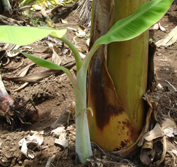|
23 October 2025
|
|
|
മലയാളം
|
|
|
|
|
|
Agriculture > Fruit
Crops > Banana (Musa spp.)
|
|
|
|
Crop Management
|
|
|
|
Production of quality planting materials
Vegetative Method
Commercial bananas are seedless and propagated exclusively by vegetative means.

|
The banana has a reduced underground stem, called the rhizome, which bears several
buds. Each of these buds sprouts and forms its own pseudostem and a new bulbous
rhizome. These daughter plants are called suckers. Banana is mostly propagated by
rhizomes and suckers viz. sword suckers and water suckers. Sword suckers have a
welldeveloped base with narrow sword-shaped leaf blades at the early stages. Water
sucker posses broad leaves, which do not produce healthy banana clumps. Suckers
of 2-4 months age are selected.
|
|
Sucker
|
Since banana is highly unstable in genetic constitution, the suckers/rhizomes should
be selected from plants, which are healthy, having all the desirable bunch qualities
and high yielding ability (possessing atleast 10 hands in a bunch).
Tissue Culture
Being a triploid plant, there is no seed setting, thus propagation by seed is not
possible and the crop is vegetatively propagated by planting rhizomes / suckers.
The soil borne diseases transmitted through rhizomes and the bunchy top disease
are a major concern. Tissue culture offers method for faster multiplication of superior
clones and production of disease free propagules using meristem tip culture method.
The process involves initiation of cultures from sterilized shoot tips obtained
from the parent banana plant, shooting and rooting in the test tube, primary hardening
in the laboratory, secondary hardening in the nursery and planting in the field.
Advantages of Tissue Cultured Banana
-
Disease free elite varieties
-
Rapid multiplication & early harvesting
-
Uniform size and age of plants
-
High quality fruit bunches
-
Available throughout the year
Top
|
|
|
|
|
|